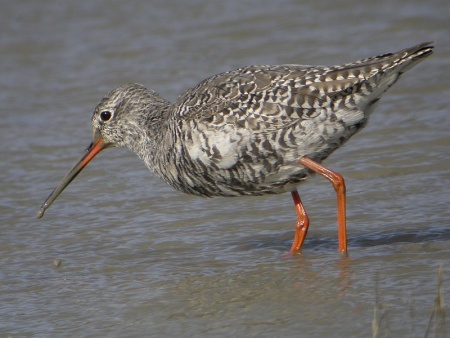| Line 1: | Line 1: | ||
;[[:Category:Tringa|Tringa]] erythropus | ;[[:Category:Tringa|Tringa]] erythropus | ||
| − | [[Image:20248Chevalier arlequin 57 .jpg|thumb|450px|right| | + | [[Image:20248Chevalier arlequin 57 .jpg|thumb|450px|right|Breeding plumage; photo by Roland RIPOLL<br />Location: Camargue, [[France]]]] |
| − | [[Image:Spotted_Redshank.jpg|thumb| | + | [[Image:Spotted_Redshank.jpg|thumb|350px|right|Winter plumage; Photo by Andy Bright<br />Location: [[England]]]] |
| − | |||
==Identification== | ==Identification== | ||
29-33 cm. Black in breeding plumage, and very pale in winter. Red legs and bill, and shows a white oval on the back in flight. Juveniles are grey-brown finely speckled white above, and have pale, finely barred underparts. | 29-33 cm. Black in breeding plumage, and very pale in winter. Red legs and bill, and shows a white oval on the back in flight. Juveniles are grey-brown finely speckled white above, and have pale, finely barred underparts. | ||
==Distribution== | ==Distribution== | ||
| − | They breed in [[Siberia]] and winter in [[Europe]] | + | They breed in [[Siberia]] and winter in Mediterranean [[Europe]] and [[Africa]], [[China]] and [[Southeast Asia]]. |
==Taxonomy== | ==Taxonomy== | ||
| − | + | A monotypic species. | |
==Habitat== | ==Habitat== | ||
They breed by pools, marshes and peatbogs. Winters on muddy estuaries. | They breed by pools, marshes and peatbogs. Winters on muddy estuaries. | ||
| − | |||
==Behaviour== | ==Behaviour== | ||
| − | 4 eggs are laid in a ground scrape. | + | *4 eggs are laid in a ground scrape. |
| − | + | *The diet includes insect larvae, shrimps and worms. | |
| − | The diet includes insect larvae, shrimps and worms. | ||
==Bird Song== | ==Bird Song== | ||
<flashmp3>Tringa erythropus (song).mp3</flashmp3><br /> | <flashmp3>Tringa erythropus (song).mp3</flashmp3><br /> | ||
| Line 22: | Line 19: | ||
{{GSearch|Tringa+erythropus}} | {{GSearch|Tringa+erythropus}} | ||
*[http://www.orientalbirdimages.org/birdimages.php?action=birdspecies&Bird_ID=1222&Bird_Image_ID=1725&Bird_Family_ID=138 View more images of this species on Orientalbirdimages] | *[http://www.orientalbirdimages.org/birdimages.php?action=birdspecies&Bird_ID=1222&Bird_Image_ID=1725&Bird_Family_ID=138 View more images of this species on Orientalbirdimages] | ||
| − | [[Category:Birds]] [[Category:Tringa]] | + | [[Category:Birds]][[Category:Tringa]] |
Revision as of 23:59, 26 July 2008
- Tringa erythropus
Identification
29-33 cm. Black in breeding plumage, and very pale in winter. Red legs and bill, and shows a white oval on the back in flight. Juveniles are grey-brown finely speckled white above, and have pale, finely barred underparts.
Distribution
They breed in Siberia and winter in Mediterranean Europe and Africa, China and Southeast Asia.
Taxonomy
A monotypic species.
Habitat
They breed by pools, marshes and peatbogs. Winters on muddy estuaries.
Behaviour
- 4 eggs are laid in a ground scrape.
- The diet includes insect larvae, shrimps and worms.
Bird Song
<flashmp3>Tringa erythropus (song).mp3</flashmp3>
Listen in an external program





